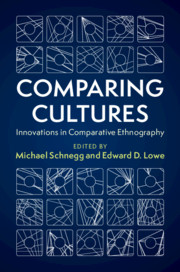Book contents
- Comparing Cultures
- Comparing Cultures
- Copyright page
- Contents
- Figures
- Tables
- Contributors
- Introduction
- Part I Binary Comparisons
- Part II Regional Comparisons
- 4 The Comparison of Structures and the Comparison of Systems
- 5 Regional Comparison in Historical Anthropology
- 6 Scaling Ethnography Up
- Part III Distant and Fluid Comparisons
- Index
- References
6 - Scaling Ethnography Up
from Part II - Regional Comparisons
Published online by Cambridge University Press: 08 May 2020
- Comparing Cultures
- Comparing Cultures
- Copyright page
- Contents
- Figures
- Tables
- Contributors
- Introduction
- Part I Binary Comparisons
- Part II Regional Comparisons
- 4 The Comparison of Structures and the Comparison of Systems
- 5 Regional Comparison in Historical Anthropology
- 6 Scaling Ethnography Up
- Part III Distant and Fluid Comparisons
- Index
- References
Summary
While ethnography produces highly contextualized understandings of fields of practice, it is hard to assess whether the phenomena revealed through ethnographic study are typical on a regional level. To overcome this shortcoming, I introduce a research design, ethnographic upscaling, that combines in-depth ethnography with larger-N regional comparisons. While the in-depth ethnography provides valid hypotheses, comparison allows the testing of whether an observed phenomenon can be generalized. To illustrate ethnographic upscaling, I present research on the social engineering of water governance in Namibia. In the course of political “decentralization,” and inspired by community-based natural resource management policies, pastoralists have developed new rules stipulating how to share water and distribute the costs of providing it. While all communities were exposed to similar blueprints, local social practices concerning water governance differ. I show that these variations can be explained if we combine an ethnographic understanding of the dynamics within communities with an understanding of both networks that impinge on the individual cases and influences of external authorities.
- Type
- Chapter
- Information
- Comparing CulturesInnovations in Comparative Ethnography, pp. 133 - 152Publisher: Cambridge University PressPrint publication year: 2020
References
- 1
- Cited by

